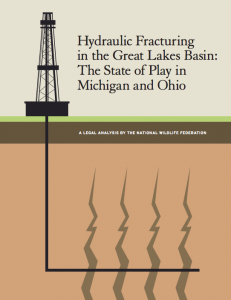We have much more to do and your continued support is needed now more than ever.
Is the Great Lakes Region Ready for a Fracking Boom?
 This is a guest post by Sara Gosman, a water resources attorney for National Wildlife Federation.
This is a guest post by Sara Gosman, a water resources attorney for National Wildlife Federation.
In the past few years, the Great Lakes region has seen a surge of interest in natural gas development using hydraulic fracturing. This controversial technique—commonly known as “fracking”—injects a mix of water, chemicals, and sand at high pressures to break open shale. Natural gas and liquids then move into the well and up to the surface.
Fracking of shallow wells has occurred in Michigan for over 30 years. But the recent interest is in fracking of deep wells, which can extend more than a mile below the surface and up to two miles horizontally. Fracking of deep wells requires more water, more chemicals, and greater pressure on the well itself. Thus, these wells pose more risks for water resources.
 Because of these risks, the National Wildlife Federation is particularly concerned about the impact of fracking on the watershed that feeds the Great Lakes—the Great Lakes Basin. So far, only a few deep shale wells have been drilled within the Basin: most are in Michigan while one is in Ohio. But deep shale underlies much of the Basin, and energy companies are looking to “liquids-rich” shale plays that provide both natural gas and liquids. For example, Encana Corporation, which holds 43,000 acres of mineral rights in the Utica/Collingwood play in Michigan, announced to investors in May 2012 that it intends to focus on the Utica/Collingwood, where it contends it has “first mover advantage.”
Because of these risks, the National Wildlife Federation is particularly concerned about the impact of fracking on the watershed that feeds the Great Lakes—the Great Lakes Basin. So far, only a few deep shale wells have been drilled within the Basin: most are in Michigan while one is in Ohio. But deep shale underlies much of the Basin, and energy companies are looking to “liquids-rich” shale plays that provide both natural gas and liquids. For example, Encana Corporation, which holds 43,000 acres of mineral rights in the Utica/Collingwood play in Michigan, announced to investors in May 2012 that it intends to focus on the Utica/Collingwood, where it contends it has “first mover advantage.”
Today, NWF is releasing a report, Hydraulic Fracturing in the Great Lakes Basin: The State of Play in Michigan and Ohio, on the legal framework governing fracking in these two states. Before any boom in fracking within the Great Lakes Basin, the report aims to assess current laws to determine whether they protect the Basin’s water resources.
In the report, we consider not just the practice of fracking itself, but the entire life cycle of fracking as it relates to water: from the freshwater needed for fracking; to activities on the well site, including fracking of the well; to the ways in which the wastewater is disposed of.
For each of these three areas, we review the laws in Michigan and Ohio. Because there are very few federal requirements, the report primarily focuses on state law. Indeed, both Michigan and Ohio have recently taken steps to address the risks of fracking. We conclude that the laws in each of the areas address some of the risks of fracking, but that more needs to be done to fully protect the Great Lakes Basin.
Based on our findings, the report offers recommendations to improve the regulatory framework in both states. For example, we suggest that:
- Both states should regulate water withdrawals for fracking under their water use laws and protect all water resources from significant impacts.
- Both states should improve regulation of fracking itself. The states should require fracturing fluid to be tested for contaminants of concern prior to fracking. The states should also require a well operator to submit a list of potential chemicals in the fluid prior to fracking. After fracking, the operator should submit a list of the chemicals actually used.
- Both states should require disposal wells that accept flowback to meet some of the critical requirements imposed on wells that accept other forms of industrial wastewater. In addition, the federal government or the states should require that flowback be treated as hazardous waste if it has hazardous characteristics.
I want to thank the law students who worked with me on the report and the Environmental Law and Policy Program at the University of Michigan Law School for its academic support of the grant project. The views in the report are the National Wildlife Federation’s.
The issue of fracking generates a lot of heated debate, but not always a lot of light. In writing this report, our goal was to shine a light on the issue by thoroughly analyzing the legal framework. My hope is that this assessment will help the states better protect the Great Lakes Basin from the risks of fracking.
![]() Help protect our nation’s wildlife and waterways from fracking.>>>
Help protect our nation’s wildlife and waterways from fracking.>>>





















